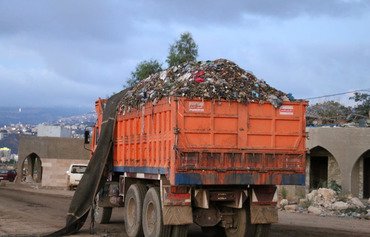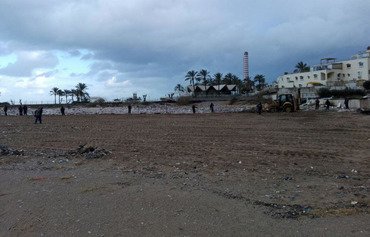Lebanon's ongoing waste management crisis has given rise to various grassroots clean-up initiatives, as government efforts to bring about a sustainable solution to the crisis have so far fallen short, activists tell Al-Mashareq.
As part of these efforts, Lebanese civil society and environmental organisations on December 14th announced they were joining forces to form a lobbying group called the Waste Management Coalition.
The coalition, launched in response to the absence of a national vision and comprehensive clean-up strategy, will push for the design and implementation of a sustainable strategy to administer solid waste.
An underwater initiative
Live Love Beirut -- a group of Lebanese working to promote a positive image of their country -- recently organised a two-day initiative that brought more than 100 divers together for an underwater cleanup, AFP reported November 26th.
The initiative, which took place off the coast near Tabarja, 25 kilometres north of Beirut, saw divers emerging from the water with nets full of plastic and glass bottles, rusted food and drink cans and even car tires.
"What we saw down there, it makes your heart hurt," said Christian Nader, a 19-year-old student, who has been diving for five years.
Lebanese expatriate Maya Saad, 29, spearheaded the dive.
Saad, who works in digital marketing, said she came up with the idea in order to "clean up the coast, which has become a trash dump".
Frustrated at the "image projected to the world of my country", she told Al-Mashareq she "launched a modest campaign to clean up some of the coastal sites, in co-operation with the Live Love Beirut online initiative".
More than 100 divers "worked our way from Tabarja up to Bouar, Jbeil (Byblos), Chekka and finally Anfeh in north Lebanon", Saad said.
"We lifted tonnes of waste from seven sites consisting mostly of rubber tires, chairs, shoes, plastic bags containing food waste and metal cans, which were sorted and recycled," she said.
The waste the campaign picked up is a "sample of what is being thrown into the sea", she said, describing the campaign as "symbolic" and "aimed at reminding people to keep the sea clean and sort waste at its source so it can be recycled".
The dive alone is not enough to solve the problem, she said, "because what is needed is an intensive nationwide awareness raising campaign throughout Lebanon, and permanent science-based solutions to the waste problem".
Dumping waste at sea
"We are seeing a determination to dump waste in the sea," said Ziad Abi Chaker, founder and CEO of Cedar Environmental, which specialises in solid waste recycling.
"Every day Lebanon produces 5,000 tonnes of waste in the wintertime and 7,500 tonnes in the summertime," he told Al-Mashareq.
Most of it is dumped in the Burj Hammoud and Costa Brava landfills, "in other words, the sea, leading to its pollution", he said. "Meanwhile, the government is looking to build waste incinerators, which would create a new problem."
The ultimate solution to the waste problem requires the development of a comprehensive plan based on decentralisation of waste treatment, Abi Chaker said.
Lebanon should be divided into 26 administrative regions, each with its own plant that handles the daily amount of waste generated by that region, he explained.
This territorial division would "protect the environment, create new jobs and employment opportunities and improve regional economies", Abi Chaker said.
'Political decision' needed
The roots of the current waste crisis date back to the 1990s, when there was an effort "to reclaim new land" by dumping waste into the sea and backfilling, said Raji Maasri, who owns and manages MORES Environmental Services.
"A plan was developed to dump waste into the sea to build up new coastal [parcels of] land in several locations," he told Al-Mashareq.
These include the area between the northern Metn coast at the Burj Hammoud landfill, through Beirut and down to Sidon, where a mountain of waste now sits on the seashore, he said.
"The problem is endemic throughout Lebanon," Maasri said. "When the trash crisis worsened in the interior, ground and artesian waters became polluted as a result of the indiscriminate dumping and burial of waste."
"Now we are seeing municipalities and civil society organisations make serious efforts to put an end to those practices," he said.
While commending these initiatives, al-Maasri said the permanent solution lies in "making a political decision to view waste as a national project that serves agriculture and industry".
The waste management crisis provides an impetus for the emergence of plants that specialise in sorting, recycling and composting, thus making waste usable, particularly in the agricultural sector, he said.
Solid waste treatment
Lebanon's current waste crisis came to a head in mid-2015, when the main landfill in Naameh was closed, with no arrangements made for an alternative.
The accumulation of waste sparked a series of protests, with demonstrators using the slogan "You stink" to express their anger at the government.
In March 2016, the government of Prime Minister Tammam Salam approved a plan to resolve the waste crisis through the establishment of two temporary treatment centres and two sanitary landfills on the Lebanese coast.
But no permanent solution has yet been found.
Municipalities and private citizens are burning waste in the open air, which prompted Human Rights Watch to warn the Lebanese authorities in early December about the resulting public health risks.
"Based on data from the Ministry of Environment and the UN Development Programme, as of 2017 there are 941 open dumps in the country, including 617 municipal solid waste dumps," HRW said. "More than 150 of these dumps are open-burned at least once a week on average."
A new solid waste treatment programme was launched on December 6th.
This will be implemented in co-operation with the EU, which presented two grants totaling $35 million for the construction of a plant for sorting and composting solid household waste as well as sanitary landfills in most areas, particularly those impacted by the Syrian refugee crisis.

![Lebanese divers take part in an initiative to clean up the coast off the town of Tabarja, 25 kilometres north of Beirut. [Photo courtesy of Maya Saad]](/cnmi_am/images/2017/12/27/10776-Lebanon-divers-initiative-600_384.jpg)





